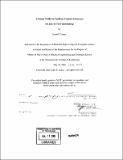| dc.contributor.advisor | Stephen Intille. | en_US |
| dc.contributor.author | Lopez, Louis F | en_US |
| dc.contributor.other | Massachusetts Institute of Technology. Dept. of Electrical Engineering and Computer Science. | en_US |
| dc.date.accessioned | 2006-07-13T15:12:58Z | |
| dc.date.available | 2006-07-13T15:12:58Z | |
| dc.date.copyright | 2005 | en_US |
| dc.date.issued | 2005 | en_US |
| dc.identifier.uri | http://hdl.handle.net/1721.1/33291 | |
| dc.description | Thesis (M. Eng.)--Massachusetts Institute of Technology, Dept. of Electrical Engineering and Computer Science, 2005. | en_US |
| dc.description | Includes bibliographical references (p. 151-152). | en_US |
| dc.description.abstract | Studying human behavior is a task that researchers in many diverse fields from medicine to ubiquitous computing perform to identify potential health risks or to better understand how computers can assist people. One effective means of acquiring data on human behavior is through just-in-time (JIT) questioning whereby researchers ask a person context-sensitive questions concerning their current activities or well being at appropriate times. Automatic JIT questioning is now possible, and it involves mobile or in-home computing devices that use sensors to determine when to ask real-time contextually- specific questions about a person's state. Unfortunately. there is a lack of dedicated, inexpensive, and easy-to-use sensors that are tailored to operate in a JIT questioning framework. This work describes the construction of a toolkit of sensors dedicated to providing the necessary, real-time contextual data that is needed to facilitate JIT questioning. Among the sensors in the toolkit are a heart rate monitor, an electrical current sensor, a UV radiation exposure sensor, a proximity and location sensor, and a multiple switch input sensor. The data returned by the sensors of the JITQ toolkit can be used to create context-sensitive computing devices that can determine appropriate times to ask JIT questions. The sensor toolkit can provide researchers with an affordable and robust option for carrying out behavioral studies using the JIT questioning paradigm. | en_US |
| dc.description.statementofresponsibility | by Louis F. Lopez. | en_US |
| dc.format.extent | 152 p. | en_US |
| dc.format.extent | 7899635 bytes | |
| dc.format.extent | 7908289 bytes | |
| dc.format.mimetype | application/pdf | |
| dc.format.mimetype | application/pdf | |
| dc.language.iso | eng | en_US |
| dc.publisher | Massachusetts Institute of Technology | en_US |
| dc.rights | M.I.T. theses are protected by copyright. They may be viewed from this source for any purpose, but reproduction or distribution in any format is prohibited without written permission. See provided URL for inquiries about permission. | en_US |
| dc.rights.uri | http://dspace.mit.edu/handle/1721.1/7582 | |
| dc.subject | Electrical Engineering and Computer Science. | en_US |
| dc.title | A sensor toolkit to facilitate context-awareness for just-in-time questioning | en_US |
| dc.type | Thesis | en_US |
| dc.description.degree | M.Eng. | en_US |
| dc.contributor.department | Massachusetts Institute of Technology. Department of Electrical Engineering and Computer Science | |
| dc.identifier.oclc | 62278175 | en_US |
